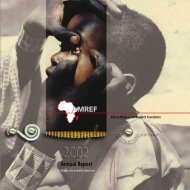Celebrating African Motherhood - Amref
Celebrating African Motherhood - Amref
Celebrating African Motherhood - Amref
You also want an ePaper? Increase the reach of your titles
YUMPU automatically turns print PDFs into web optimized ePapers that Google loves.
52<br />
Catch Me Before I Fall<br />
The delightful sound of children singing fl ows from an offi ce trailer at the<br />
Dindela Community Home-Based Care Centre in Sekhukhune District,<br />
Limpopo. It is lunchtime, and a group of teenagers is making music as they<br />
wait for the smaller children to eat before they take their turn in the dining<br />
room. Three girls swing hoolahoops outside, a few metres away from the<br />
open door of a shed in which two women are fussing over huge, steaming<br />
pots.<br />
In another offi ce trailer, Miriam Sibongile is winding up a meeting of<br />
community care workers to review the past month’s activities and plan<br />
for the next. There are 22 community organisations working in Dindela.<br />
Sibongile supervises the 35 care workers drawn from these organisations<br />
who work with the 3,230 children who have so far been identifi ed for the<br />
programme.<br />
“Every day, we go house-to-house looking for children living in diffi cult<br />
circumstances and checking on the progress of those already registered,”<br />
says Sibongile. “They may be orphaned and alone, or they may have<br />
guardians, a parent, or two sick parents who are unable to look after them.<br />
We monitor the health of the children and assess their needs for food,<br />
school uniform, medication or psychological support.”<br />
The Dindela Centre, one of 16 drop-in centres in Sekhukhune, off ers<br />
the children a place where they can get a meal, companionship and<br />
psychological support. “We serve the children breakfast before they go to<br />
school, then they come back for lunch. We help them with homework, and<br />
they also have time for drama, singing and dancing.”<br />
The caregivers take the children through life skills sessions, including lessons<br />
on sexuality and how to cope with stressful situations. They are encouraged<br />
to make ‘memory boxes’ in which to store jewellery, photographs, letters<br />
and other keepsakes of loved ones who have died.<br />
The community care workers link needy parents and guardians with the<br />
social welfare offi ce so that they can get grants for child support – R240<br />
(US$32) per month – given by the Government. A major challenge has been<br />
lack of vital documents, such as birth certifi cates or parents’ identity cards,<br />
which must be produced before they get the money. To ease the process of<br />
getting the papers and processing of grants, AMREF has helped to create<br />
a referral system between the community care givers, Department of<br />
Social Services and relevant Government departments. The Department of<br />
Health refers sick and needy children who show up at health facilities to<br />
social workers, who link them up with the community care workers.<br />
“By bringing together all the stakeholders, AMREF has helped us to<br />
reach out to more children and give them substantial support,” Sibongile<br />
observes. “We have been given tools to collect data about the children,<br />
making it easier to meet their needs. The training we received from AMREF<br />
has given us skills and knowledge to help the families to improve their<br />
lives as we are able to advise parents and guardians on issues like good<br />
management of their money and how to monitor the progress of their<br />
children in school.”<br />
Sibongile’s expression turns to one of concern as her gaze settles on a sad,<br />
12-year-old girl sitting quietly alone. The girl’s leg is swollen and she has<br />
bruises on her face. The night before, she had appeared at Sibongile’s door,<br />
saying that she had been beaten by her grandfather, whom she and her<br />
sister had gone to live with when their parents died. This is the third time<br />
this has happened.<br />
“I have spoken to the grandparents before and asked them not to mistreat treat





